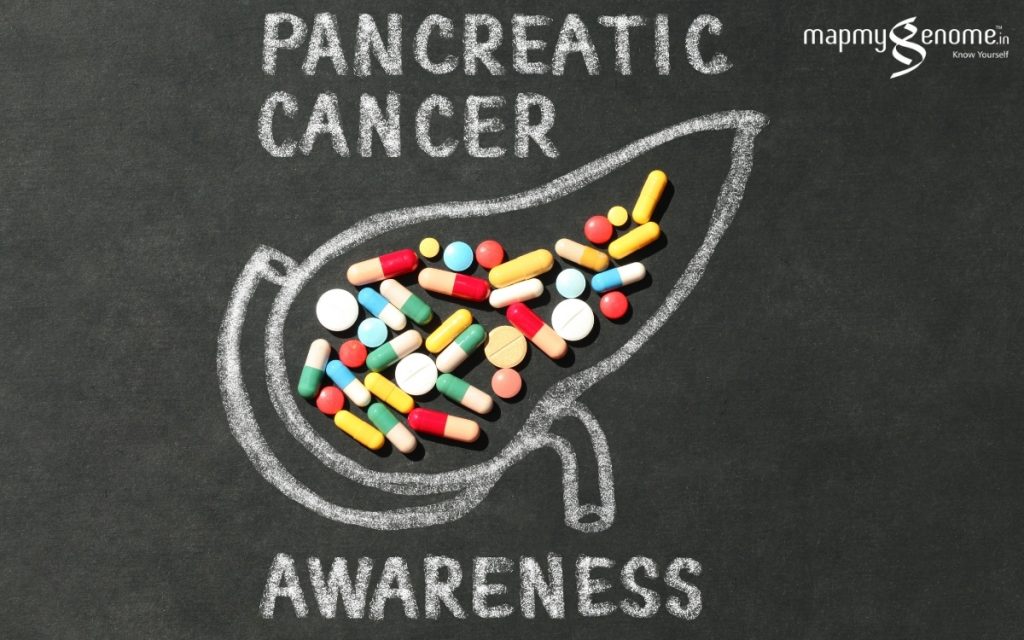7 Questions for Pancreatic Cancer Awareness
Nov 30, 2020
4712 Views
1. FIRST THINGS FIRST, WHAT ARE PANCREAS?
This is a good place to start. Pancreas is an organ that sits within the abdominal cavity, behind your stomach, and surrounded by your liver and small intestine. You read that right. ‘Pancreas’ is singular– we have one ‘pancreas’. I wasn’t involved in naming it, so I can’t tell you why it’s named that way. But what I can tell you, is that the pancreas is spongy, fish-shaped, about 6-10 inches long, and is placed horizontally across the abdomen. Also, names like ‘Suhas’, ‘James’, and ‘Yunus’ are also for single individuals who don’t necessarily occur in pairs except, of course, if they have a twin brother. Or sister.
2. WHAT DOES THE PANCREAS DO?
You’re asking all the right questions! The pancreas is a vital organ – as is your heart, lungs, kidneys, liver, and spleen- with two crucial roles:
1. Endocrine: Making enzymes that help the body digest food
- Trypsin and chymotrypsin: Their names may be complicated, but all you need to know is that they are the enzymes that digest protein
- Amylase: Its the name of the pancreatic enzyme responsible for digesting carbohydrates
- Lipase: This enzyme digests lipids (or fats)
2. Exocrine: Making hormones that control blood sugar levels
Specialized pancreatic cells called islet of Langerhans – I wasn’t involved in naming this either – produce hormones and release them into the bloodstream. There are 2 important hormones produced by the pancreas. These are:
- Insulin: You’re already familiar with this hormone, who’s job is to lower blood sugar. Yes, you just increased your knowledge about diabetes right here!
- Glucagon: Its job is to raise blood sugar levels. This might seem like an odd thing, because we only hear about the need to lower blood sugar given that we’re in the diabetes capital of the world. However, the truth is that without glucagon, we’d have no way of keeping our blood sugar levels from dropping too low and causing ‘hypo’glycemia aka low blood sugar. Low blood sugar can be quite problematic as it can cause decreased energy, lethargy, dizziness, fainting and, in extreme cases, even coma.
It’s a delicate balance between high blood sugar and low blood sugar, and the critical task of maintaining this balance is what the exocrine function of the pancreas is.
Look at you learning so much! You now understand that the pancreas is an important organ with an important job even though it looks like a flat fish, and its health is definitely worthy of attention. This is precisely why we celebrate Pancreatic Cancer Awareness Month.
Pancreatic cancer awareness is important because:
- Many people aren’t aware that pancreatic cancer can affect anyone,
- Pancreatic cancer can be difficult to diagnose early,
- It is most effectively treated when detected early, and
- Understanding early signs, one’s risks, and available screening tests for pancreatic cancer can save lives.
But you’re aware now, and that’s really going to do you good. Well done!
What follows is valuable information about early diagnosis, understanding your risk, and what you can do to screen. Let me assure you that what you will read below will be useful, easy to understand, and not an overload of unnecessary, out-of-context, or scary information. There’s Google for that :P. And from working with patients who Google everything they possibly can before an appointment, I understand how the word ‘cancer’ may be scary, and that itself can sometimes make us wanna not even read about it. However, as a genetic counselor, what I can tell you is that knowledge is power, timely screening saves lives, and you already know that prevention is better than cure. So let’s do this, and keep reading. You can thank me later in the comments. ?
3. WHY IS PANCREATIC CANCER CHALLENGING TO DIAGNOSE?
There are a few reasons for this. Once you read these, you will know why it is critical to raise awareness about pancreatic cancer so that more people can get diagnosed in a timely way. Early diagnosis saves lives. Unfortunately, for pancreatic cancer, most cases get diagnosed at Stage IV. This is a very advanced stage of disease. Here is why pancreatic cancer can be difficult to diagnose early:
- Now, because you have read this blog, you already know that the pancreas is located within the abdomen cavity. This actually keeps it protected from damage due to a fall or a punch to the stomach (I won’t ask you who would want to punch you in the stomach or why). However, this safe placement is the very reason why a tumor cannot usually be seen or feel the tumor during a physical exam.
- Pancreatic cancer symptoms are not always obvious. In fact, some are pretty vague (scroll down for symptoms). The vast majority of symptoms appear gradually and develop over time.
- If you know about the PSA test to screen for prostate cancer or the CA-125 test to screen for ovarian cancer, these types of screening tests measure levels of specific molecules in the blood (If you didn’t know about these important tests, you do now, and you also have more than one reason to thank me in the comment section). These biological molecules produced by cells are called ‘biomarkers’. Unfortunately, there are no proven biomarkers (yet) to help doctors identify early pancreatic cancer.
- The tests that are available to diagnose pancreatic cancer are unable to consistently detect small lesions (non-specific damage or changes in normal tissue), pre-cancers or even early stage cancers. This is a consequence of a combination of the limitation of technology and the internal placement of the pancreas.
- Current research does not specify whom to screen, and the work in this field is ongoing. This is what we call ‘risk stratification’, and cancer researchers are usually able to help inform screening by classifying individuals as ‘high risk’, ‘medium risk’ and ‘low risk’. This clarity from scientific research helps doctors identify ‘high risk’ individuals who may benefit from regular screening. Screening each and every person without considering their risk status can understandably increase medical, financial and emotional costs and is not recommended.
4. WHAT ARE THE SYMPTOMS OF PANCREATIC CANCER?

Remember how we talked about vague symptoms caused by early pancreatic cancer? Here are the most common symptoms:
- Pain (in abdomen or back)
- Weight loss
- Nausea
- Loss of appetite
- Changes in stool (dark colored or greasy stools)
- A recent diagnosis of diabetes (This is because of the role that the pancreas play in insulin production. Remember?)
- Fatigue or weakness
- Feeling low or depressed
5. HOW DO I KNOW IF I AM AT A HIGHER RISK FOR PANCREATIC CANCER?
This is an important question to ask, and a genetic counseling appointment can give you all (ok, most of) the answers you need.
Usually, family history can be a useful tool in making an assessment of one’s risk. In genetic counseling lingo, we call this ‘risk assessment’, and family history of pancreatic cancer is considered a ‘risk factor’. If you have a ‘first-degree relative’ (genetics jargon for parents, siblings, and children) who has/had pancreatic cancer, you may be at increased risk yourself. It is strongly recommended that the person who has/had the diagnosis consider genetic testing for inherited genetic changes that are known to increase the risk for predisposition to pancreatic cancer. A genetic counselor is a really helpful medical experts who will document, analyze, and make a genetics assessment of your family history (and any other relevant risk factors from your medical history or lifestyle), and I’m not just saying this because I am one.

Genetic counselors are trained professionals with unique expertise in medical genetics and psychological counseling. They not only analyze and interpret family history and medical history, but also:
- Identify the right kind of available genetic testing for each specific individual
- Help you make a decision about whether or not you would like to have genetic testing. Genetic testing is voluntary, should not be forced onto everyone, and is up to an individual to decide
- Help you understand your genetic test report if you choose to have genetic testing
- Discuss available strategies for screening and/or risk reduction
- Make referrals to a specialist (if needed)
- Are available to your doctors to help them incorporate findings of your genetic test report into your health management and care
- Can help you share your report with your family. This can sometimes be challenging- informationally and emotionally, and genetic counselors are expert health communicators with tonnes of empathy.
Are there to help you cope with your own genetic testing results in a way that addresses any fears, worries, concerns, anxieties, sadness that you may be experiencing. These are normal human reactions to receiving unfavorable news, but I can tell you from experience that most people will eventually adjust well to their newly discovered genetic status. We are all much stronger than we imagine, and I am always inspired by the resilience I see in my patients.
6. NO ONE IN MY FAMILY HAS PANCREATIC CANCER. ARE THERE ANY OTHER RISK FACTORS?
I’m definitely impressed by all these great questions. Its probably because I’ve written them myself, but here are other risk factors that are important to consider when thinking about your risk for pancreatic cancer:
- Family history of breast cancer, ovarian cancer, colon cancer, or gastric (stomach) cancer
- Family history of melanoma (a specific type of skin cancer)
- Pancreatitis (inflammation of the pancreas that typically begins at about age 20 years)
- Any inherited conditions known to be associated with pancreatic cancer (Werner syndrome, Ataxia Telangiectasia, carriers of Cystic Fibrosis, are some examples.) You don’t really need to really know details about these conditions, but I listed these to explain how certain genetic ‘syndromes’ can have a main symptom that’s completely unrelated to pancreatic cancer, but may also increase the risk for someone to also have pancreatic cancer. In medicine, the term ‘syndrome’ is used to represent a collection of symptoms that are seen together. For some genetic syndromes, pancreatic cancer may be part of the spectrum of symptoms seen.
- Diabetes
- Smoking
- Obesity
- A diet that is high in red meat and processed meats
- Age
- Gender (males are at a slightly higher risk)
7. OK, I’VE READ THIS ARTICLE. WHAT SHOULD I DO NOW?
Aaaah! Your questions continue to be impressive ? If you’ve read so far, you’ve come to the end of this article. And if everything has made sense so far, you already know what to do, but I’ll list them out here in bullets because its much better to summarize in bulleted take-aways than a wordy paragraph. So here goes. All you need to do, are 3 things:
- Do some investigation, speak with your parents and relatives, and find out if you have a family history of cancer. Speak with both sides (maternal and paternal) of your family as we inherit our genes from both parents, document the age of diagnosis, current age (if currently living) or age of death if the person with pancreatic cancer is deceased.
- Set up an appointment with a genetic counselor. If you are concerned about your risk for pancreatic cancer, this can be an important way for you to get a genetic expert to make an assessment of your risk. The family history information you gathered would be very helpful to a genetic counselor in risk assessment. If you are identified to be at ‘high risk’, a genetic counselor will discuss available genetic testing options; their benefits, risks, and limitations; and help you make a decision about whether genetic testing right for you. If you are identified to be at ‘low risk’, then you can have the benefit of this reassurance.
- Look out for symptoms. Yes, the symptoms are vague, and who really hasn’t experienced tummy aches, strange stools, or feeling low from time to time? However, the more you are aware of the symptoms, the more you can play an active part in your own health care and speak to a doctor if you notice anything that seems worrisome to you. You are now an empowered advocate of your own health!
Alright, I’ll admit it… I summarized with bullets and words. But you’re glad I did, aren’t you?
Please consider sharing this article. Knowledge really is power, and if you have found value in reading this, then I would know that I’ve done an acceptable job as a genetic counselor who promised to give you information that was going to be useful and perhaps made you feel like you are capable of understanding complex medical stuff in a way that was not jargon-filled, not emotionally overwhelming and is, potentially, life-saving. You’re now empowered with knowledge and understanding, and I hope you’ve enjoyed reading this as much as I enjoyed writing this for you. You’ve come a long way in your understanding of the pancreas, its functioning, and how to care for the health of this vital organ. Even if it looks like a flat fish in your tummy.


